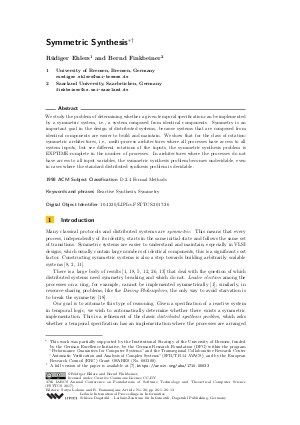Symmetric Synthesis
Authors Rüdiger Ehlers, Bernd Finkbeiner
-
Part of:
Volume:
37th IARCS Annual Conference on Foundations of Software Technology and Theoretical Computer Science (FSTTCS 2017)
Part of: Series: Leibniz International Proceedings in Informatics (LIPIcs)
Part of: Conference: IARCS Annual Conference on Foundations of Software Technology and Theoretical Computer Science (FSTTCS) - License:
 Creative Commons Attribution 3.0 Unported license
Creative Commons Attribution 3.0 Unported license
- Publication Date: 2018-02-12
File

PDF
LIPIcs.FSTTCS.2017.26.pdf
- Filesize: 0.52 MB
- 13 pages
Document Identifiers
Subject Classification
Keywords
- Reactive Synthesis
- Symmetry
Metrics
- Access Statistics
-
Total Accesses (updated on a weekly basis)
0PDF Downloads0Metadata Views
Abstract
We study the problem of determining whether a given temporal specification can be implemented by a symmetric system, i.e., a system composed from identical components. Symmetry is an important goal in the design of distributed systems, because systems that are composed from identical components are easier to build and maintain. We show that for the class of rotation-symmetric architectures, i.e., multi-process architectures where all processes have access to all system inputs, but see different rotations of the inputs, the symmetric synthesis problem is EXPTIME-complete in the number of processes. In architectures where the processes do not have access to all input variables, the symmetric synthesis problem becomes undecidable, even in cases where the standard distributed synthesis problem is decidable.
Cite As Get BibTex
Rüdiger Ehlers and Bernd Finkbeiner. Symmetric Synthesis. In 37th IARCS Annual Conference on Foundations of Software Technology and Theoretical Computer Science (FSTTCS 2017). Leibniz International Proceedings in Informatics (LIPIcs), Volume 93, pp. 26:1-26:13, Schloss Dagstuhl – Leibniz-Zentrum für Informatik (2018)
https://doi.org/10.4230/LIPIcs.FSTTCS.2017.26
BibTex
@InProceedings{ehlers_et_al:LIPIcs.FSTTCS.2017.26,
author = {Ehlers, R\"{u}diger and Finkbeiner, Bernd},
title = {{Symmetric Synthesis}},
booktitle = {37th IARCS Annual Conference on Foundations of Software Technology and Theoretical Computer Science (FSTTCS 2017)},
pages = {26:1--26:13},
series = {Leibniz International Proceedings in Informatics (LIPIcs)},
ISBN = {978-3-95977-055-2},
ISSN = {1868-8969},
year = {2018},
volume = {93},
editor = {Lokam, Satya and Ramanujam, R.},
publisher = {Schloss Dagstuhl -- Leibniz-Zentrum f{\"u}r Informatik},
address = {Dagstuhl, Germany},
URL = {https://drops.dagstuhl.de/entities/document/10.4230/LIPIcs.FSTTCS.2017.26},
URN = {urn:nbn:de:0030-drops-83996},
doi = {10.4230/LIPIcs.FSTTCS.2017.26},
annote = {Keywords: Reactive Synthesis, Symmetry}
}
Author Details
References
-
Dana Angluin. Local and global properties in networks of processors (extended abstract). In Twelfth Annual ACM Symposium on Theory of Computing (STOC), pages 82-93, 1980.

- Paul C. Attie and E. Allen Emerson. Synthesis of concurrent systems with many similar processes. ACM Trans. Program. Lang. Syst., 20(1):51-115, 1998. URL: http://dx.doi.org/10.1145/271510.271519.
-
Ashok K. Chandra, Dexter Kozen, and Larry J. Stockmeyer. Alternation. J. ACM, 28(1):114-133, 1981.

-
E. M. Clarke, Orna Grumberg, and Doron Peled. Model Checking. MIT Press, 1999.

-
Shimon Cohen, Daniel J. Lehmann, and Amir Pnueli. Symmetric and economical solutions to the mutual exclusion problem in a distributed system. Theor. Comput. Sci., 34:215-225, 1984.

- Rüdiger Ehlers. Symmetric and efficient synthesis. PhD thesis, Saarland University, 2013. URL: http://scidok.sulb.uni-saarland.de/volltexte/2013/5607/.
-
Rüdiger Ehlers and Bernd Finkbeiner. Symmetric synthesis. ArXiV/CoRR, 1710.05633, 2017. Full version of this paper.

-
E. Allen Emerson and Jai Srinivasan. A decidable temporal logic to reason about many processes. In Proc. PODC, pages 233-246, 1990.

-
Bernd Finkbeiner and Sven Schewe. Uniform distributed synthesis. In Proc. LICS, pages 321-330, 2005.

-
Jörg Flum, Erich Grädel, and Thomas Wilke, editors. Logic and Automata: History and Perspectives [in Honor of Wolfgang Thomas], volume 2 of Texts in Logic and Games. Amsterdam University Press, 2008.

- Swen Jacobs and Roderick Bloem. Parameterized synthesis. Logical Methods in Computer Science, 10(1), 2014. URL: http://dx.doi.org/10.2168/LMCS-10(1:12)2014.
-
Ralph E. Johnson and Fred B. Schneider. Symmetry and similarity in distributed systems. In Proc. PODC, pages 13-22. ACM, 1985.

-
Evangelos Kranakis. Invited talk: Symmetry and computability in anonymous networks. In Nicola Santoro and Paul G. Spirakis, editors, Proc. SIROCCO, pages 1-16. Carleton Scientific, 1996.

-
Orna Kupferman and Moshe Y. Vardi. Synthesis with incomplete information. In Proc. ICTL, 1997.

-
Orna Kupferman and Moshe Y. Vardi. μ-calculus synthesis. In Proc. MFCS, pages 497-507, 2000.

-
Orna Kupferman and Moshe Y. Vardi. Synthesizing distributed systems. In 16th Annual IEEE Symposium on Logic in Computer Science (LICS 2001), July 2001.

-
Orna Kupferman and Moshe Y. Vardi. Safraless decision procedures. In FOCS, pages 531-542. IEEE, 2005.

-
Daniel J. Lehmann and Michael O. Rabin. On the advantages of free choice: A symmetric and fully distributed solution to the dining philosophers problem. In Proc. POPL, 1981.

-
Amir Pnueli. The temporal logic of programs. In FOCS, pages 46-57. IEEE, 1977.

-
Amir Pnueli and Roni Rosner. On the synthesis of an asynchronous reactive module. In Giorgio Ausiello, Mariangiola Dezani-Ciancaglini, and Simona Ronchi Della Rocca, editors, ICALP, volume 372 of Lecture Notes in Computer Science, pages 652-671. Springer, 1989.

-
Amir Pnueli and Roni Rosner. Distributed reactive systems are hard to synthesize. In FOCS, volume II, pages 746-757. IEEE, 1990.

-
Michael O. Rabin. Automata on Infinite Objects and Church’s Problem. American Mathematical Society, 1972.

- Desh Ranjan, Richard Chang, and Juris Hartmanis. Space bounded computations: Review and new separation results. Theor. Comput. Sci., 80(2):289-302, 1991. URL: http://dx.doi.org/10.1016/0304-3975(91)90391-E.
-
Sven Schewe and Bernd Finkbeiner. Bounded synthesis. In Kedar S. Namjoshi, Tomohiro Yoneda, Teruo Higashino, and Yoshio Okamura, editors, ATVA, volume 4762 of Lecture Notes in Computer Science, pages 474-488. Springer, 2007.

-
Pierre Wolper. Synthesis of Communicating Processes from Temporal-Logic Specifications. PhD thesis, Stanford University, 1982.

-
Masafumi Yamashita and Tiko Kameda. Computing on an anonymous network. In Proc. PODC, pages 117-130, 1988.

